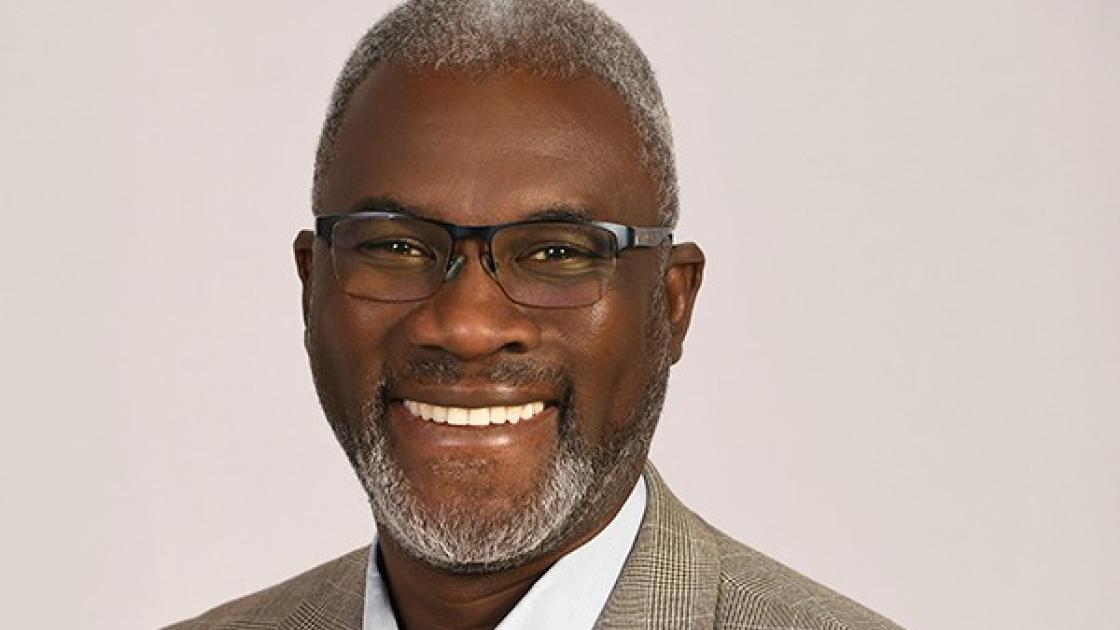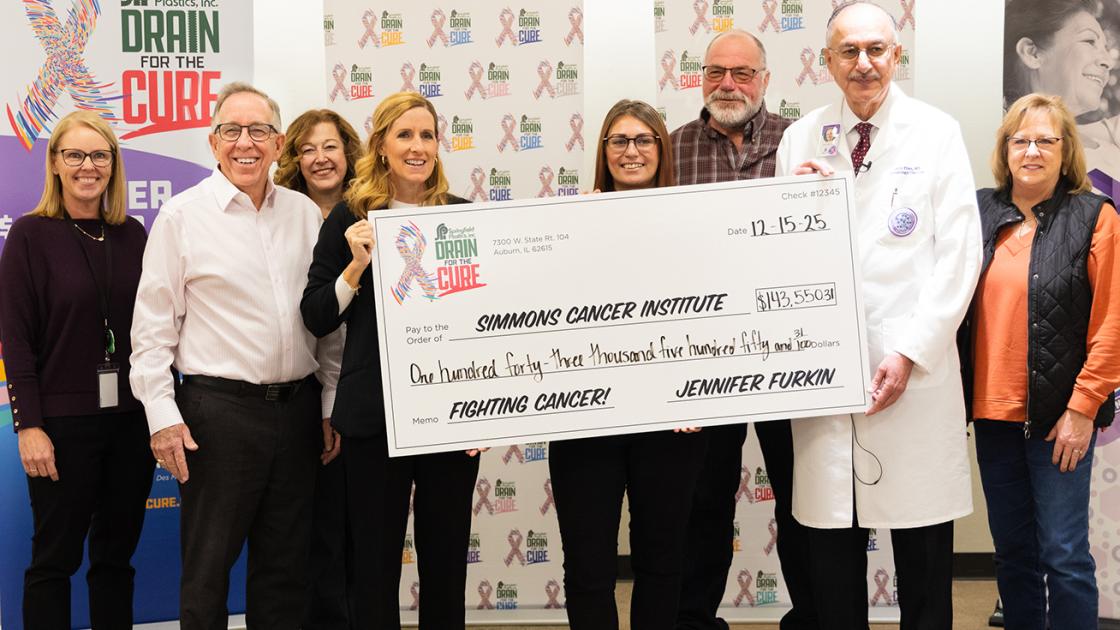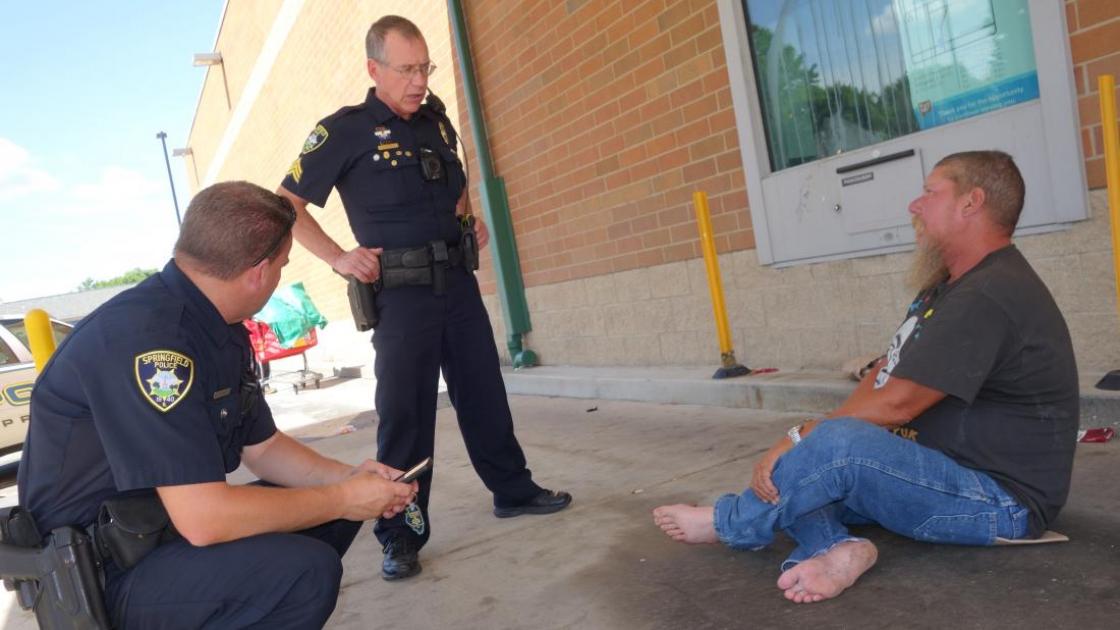
The Team Approach
Police officers, SIU partner to aid city’s most vulnerable population
Written and photographed by Steve Sandstrom
Published in Aspects Magazine, Summer 2018 | Vol 41-3
Harold Cook, 52, is sleeping in the drive-through lane at a shuttered pharmacy when the squad car pulls up. His head resting on the concrete, he has sought refuge from the sun on a hot day. Springfield Police Officer Chris Jones is looking for Cook because of a missed appointment with a health care provider. Harold is one of the city’s homeless population.
Harold sits up and pays attention as Jones approaches.
“Hey Harold, you alright?”
“Yeah, I just got too hot.”
“We’ve got to move you out of here, but I want to talk you. How come you missed your appointment yesterday?”
“What? Oh — it was raining,” he says. “It was pouring down rain at 9 o’clock.”
As the men converse, a second police car pulls in. Sgt. Gerry Castles, head of Springfield’s Neighborhood Police Officer (NPO) program, gets out and joins the pair talking under the Walgreens awning.
Jones arranges a make-up date for the missed appointment, but Harold explains that pain and numbness in his feet and knees can sometimes make walking difficult. “It’s been a long time since I seen a doctor,” the bearded man says.
“Tell you what, you get to the appointment and I’ll give you a ride back to wherever you want to go,” says Jones.
The homeless man is staying in an empty garage behind an abandoned home two blocks away. Jones had checked on him at the first location before finding him asleep. Castles tells Harold the city will soon be boarding up the structure and that he should consider alternatives. The men lock eyes.
“This has to do with you and your well-being,” Castles says. “We’re trying to help you do something about it. We care, man, but we can’t drag you to this appointment. We’re asking you to be there. It’s not going to cost you anything and it’ll help you in the long run.”
Harold studies the men for a moment.
“Hey, it’ll take me a while to get there, but I’ll go,” he says.
Castles and Jones are part of a group of Springfield Police Department (SPD) officers and health care providers from SIU School of Medicine who are leading efforts to help Harold and others like him. They want to look beyond the perfunctory treatment that the homeless typically receive and address its root causes.
According to latest figures from the U.S. Department of Housing and Urban Development, there were more than 13,000 people living without homes in Illinois in January 2017. Springfield’s homeless population hovers around 300. The Springfield Police Department would like to see a measurable reduction in its homeless numbers. Fewer individuals living on the streets will reduce interactions among city police and health care providers, ultimately improving the community’s health while freeing up staff and revenue for other purposes.
Using a Homeless Outreach Team, or “HOT,” modeled on evidence-based programs that have been successful in other urban areas, the SPD hopes to improve conditions for some of the city’s most vulnerable residents and stop the revolving door process that ties up precious public resources and personnel.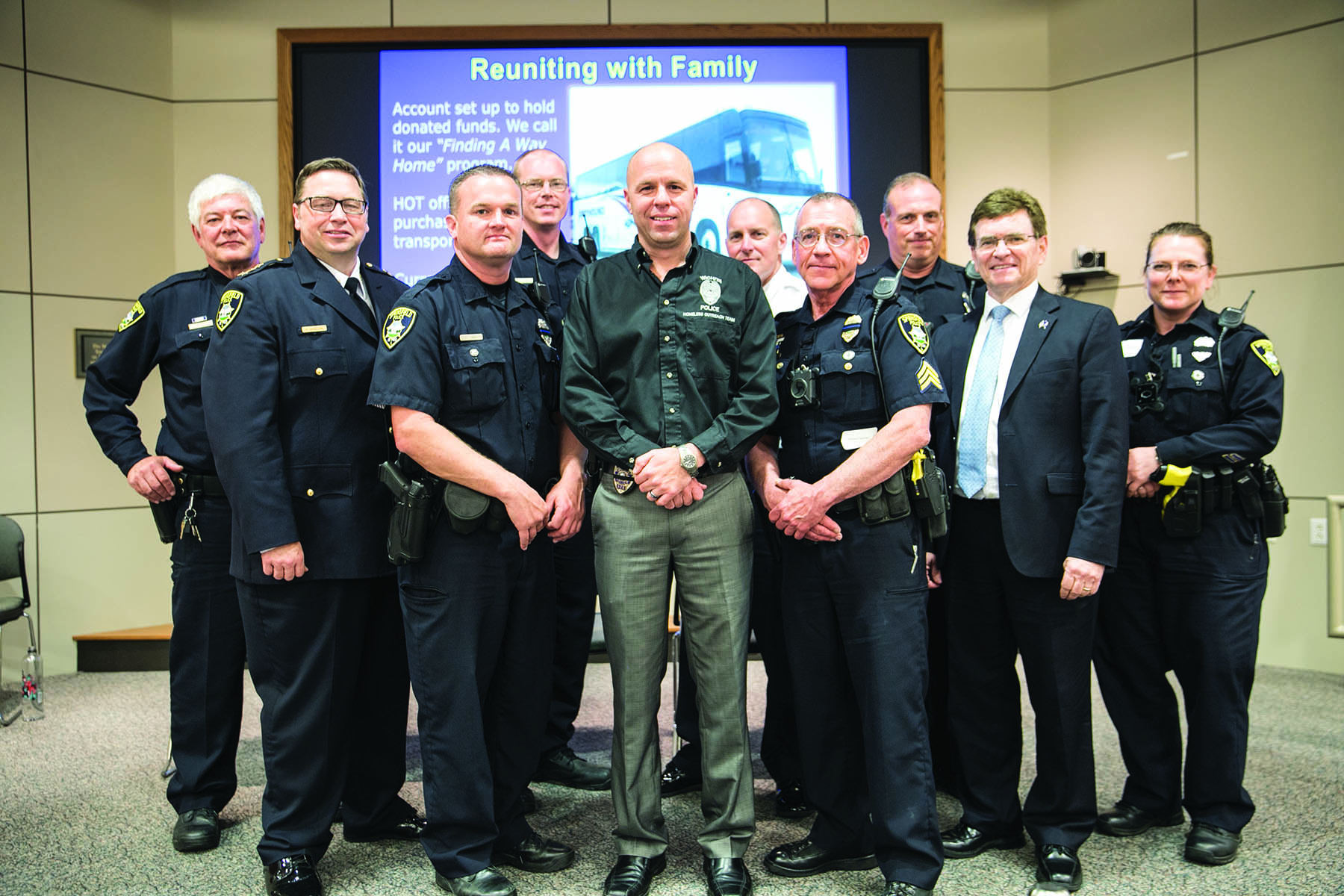
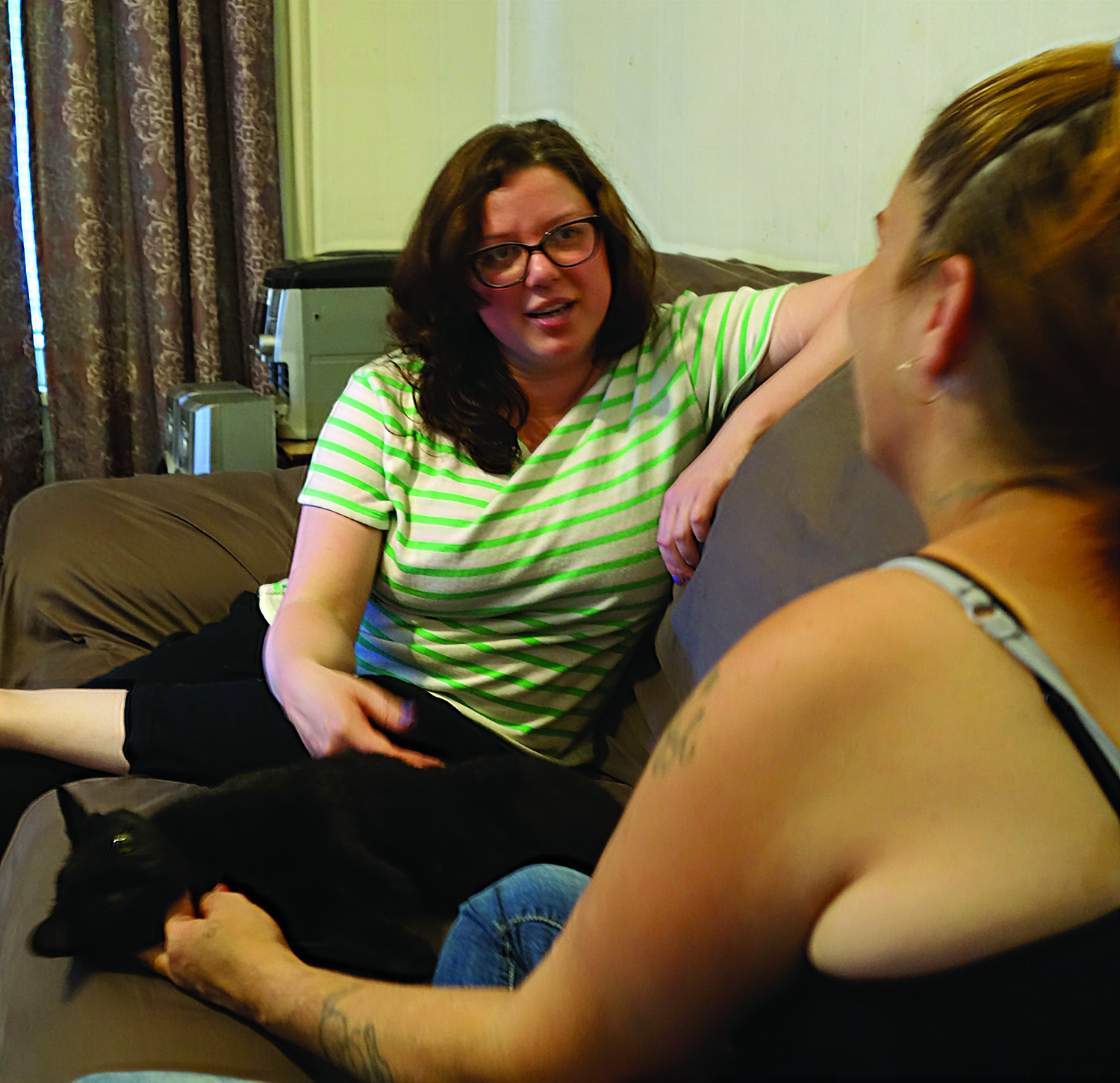
The SPD and Tracey Smith, DNP, an associate professor of family medicine at SIU School of Medicine, are spearheading the effort. It had its origins in a similar project in the Enos Park neighborhood. The low-income neighborhood encompasses 36 square blocks of residential and business properties north of the school’s main campus. The area has socioeconomic factors such as a high poverty rate, unemployment and homelessness that contribute to poor health outcomes.
Talk and a pair of socks
Inspired by the successes of a HOT in Witchita, Kansas, the Springfield police invited Officer Nate Schweithale, creator of Wichita’s HOT, to speak in Springfield. The goal was to inform potential collaborators about the homeless outreach team approach and enlist help to launch it in Springfield. The larger buy-in would be crucial to the plan gaining traction. As Springfield Police Chief Kenny Winslow said at the forum, “This is not just a police problem. It’s a community problem.”
Schweithale told how he had frequent encounters with the homeless in Witchita and generated numerous tickets but realized that the progress was elusive: Businesses would contact the police to report homeless individuals for public intoxication, blocking an entryway or after they were injured in a fall or scuffle. The homeless were processed and returned to the streets, often repeating the behavior that led to their brief incarceration.
Schweithale said his police work with the homeless started to resemble “the definition of insanity: doing the same thing over and over and expecting a different result.” To combat the futility, Schweithale researched what had worked in other communities and discovered a successful HOT program in Colorado Springs. He began adopting it for his force. During calls he would engage the homeless in conversation to see what services they needed and offer a pair of new socks to the men and women he encountered.
The small gestures of compassion paid larger dividends. Schweithale cited studies that showed getting a homeless person into stable housing can save $40,000 annually when calculating the expenses of community resources like police, medical providers, social service agents and ambulance rides. “Building trust with the homeless takes time,” he says, “but it is cost-effective.”
Eventually, the Wichita PD assigned three officers to the team. They have helped more than 900 homeless find housing during the five years the program has been in practice.
A homeless outreach team works to build trust between law enforcement and people struggling with homelessness. As Schweithale explained, police are the logical entry point into the system because they can go places that social workers can’t, for both safety and legal reasons. They can help make the connection between the homeless individual and a social service or health care worker who can ultimately help treat the underlying factors to restore some stability and lead them toward a healthier life. They can also direct the person to government services, short-term shelter or subsidized housing.
Treating the roots
Homelessness is often seen as a symptom of a larger problem. Mental health or substance abuse issues may have been caused by childhood emotional trauma, neglect or poverty. Left untreated, a problem can be compounded by an inability to manage money or by being kicked out of the house by a spouse. It can lead a person to a depressive state in which he or she feels there is little hope and no reason to plan for a future beyond the next meal. Living on the streets places the body into survival mode. Even with proper nutrition, this creates toxic stress on the person’s health.
Social workers are crucial parts of an outreach team. Meghan Golden is assistant director of population health integration at SIU and one of the primary social workers providing counsel and therapy to the homeless. She dedicates a few hours each week to the homeless service and has counseled more than 20 patients.
The outreach requires a different mindset, Golden says.
“Our system fails the sickest people because it makes them come to us. It’s unreasonable to expect that from someone who might be schizophrenic or depressed, or they’ve had some horrific trauma, so they don’t trust people. We have to go out and engage them where they are comfortable if we want to build relationships and get them into the clinic.”
Golden’s involvement began informally, with occasional requests to assist police on calls during the evenings or on lunch hours. Over time, the group started noticing calls to the police declining. “The clients were getting better, using fewer emergency services and more intended services, so we started seeing the cost savings too,” she says.
As the system evolved, “it’s gotten more person-centered and a lot more effective,” Golden says. “We’re starting to reach those who need it most. I’m really excited to be a part of this.”
While Springfield offers a variety of social services and medical care providers, coordination is sometimes lacking. “The system works best as a co-responder model,” Jones says. “A substantial amount of time is required to build trust and make sure that people who are struggling meet with mental health care providers and social workers. Law enforcement coordination will be critical to bringing help to these individuals, wherever they may be. If we can have at least one officer dedicated to the HOT effort and implement some of these tactics, we should be able to improve things here.”
Officer Jones thinks the concepts of the program have already proven themselves locally in dollars and man-hours saved. Additional grant support and corporate donations are welcome, and would allow the HOT program to offer more services and incentives. Wichita’s program offers Greyhound bus tickets to clients who land a new job or are reuniting with distant family members.
With SIU onboard, a reallocation of duties within the SPD remains the sticking point. Were that to occur, the benefits to the community and to the health of nearly 300 distressed men and women could be substantial.
Sgt. Matt Doss agrees. “Cops don’t have all the answers and we aren’t social workers, but we all want to help people live a better life. I can now ask for help from Meghan, Tracey, Hope Cherry, Dr. Nichole Mirocha or anyone at SIU School of Medicine, to help someone who often has no one and no hope in dealing with the physical and mental problems in life,” he says.
“There is a whole team of people that will do everything possible to help. This has never happened before in Springfield in the 18 years I’ve been here. We as the police can never go back to the old way of doing things.”

